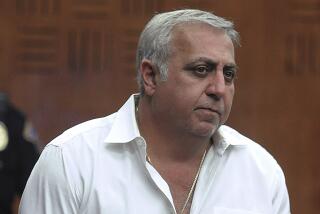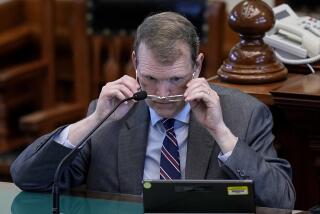Contact Was More Extensive Than Previously Disclosed : Meese Details Ties to Wedtech Defendant
- Share via
NEW YORK — Former Atty. Gen. Edwin Meese III acknowledged Thursday under cross-examination in the racketeering and fraud trial of E. Robert Wallach that his dealings with Wallach were far more extensive than he had previously admitted.
Meese said he had frequent meetings and reported back to Wallach on some of Wallach’s lobbying requests while the San Francisco lawyer was trying to help win government contracts for Wedtech Corp., a defunct and now-discredited New York defense contractor.
Meese also acknowledged that his intention to give Wallach a Justice Department job was far more serious than he admitted earlier this week. Meese told federal prosecutor Baruch Weiss he had considered hiring Wallach as recently as 1987--after the FBI and New York prosecutors had begun their criminal investigation of the Wedtech scandal.
Meese’s cross-examination also brought to light memos in which Wallach detailed the kinds of government jobs he would like, referring to the Justice Department and posts such as solicitor general and White House counsel. Said one Wallach memo: “Without doubt the opportunity to work with you regularly and do the things we discussed” is refreshing.
In response to the Wallach memos, Meese said his friend seriously wanted to be the Justice Department’s chief of staff.
The courtroom burst into laughter when a Wallach memo made reference to Meese’s plans to help then-Vice President George Bush become President.
“You once said something about how you and I could make Bush into a winner in ’88. I think you’re right. But I emphasize that I think it’s a long haul,” the memo read.
Attack Credibility
Prosecutor Weiss spent all day Thursday trying to destroy Meese’s credibility, apparently in the belief that, if the jury believes Wallach obtained nothing from Meese, Wallach may go free.
Wallach is charged with fraudulently obtaining more than $500,000 from Wedtech by using his influence with Meese, a longtime friend and former law school classmate at the University of California at Berkeley. The firm, once a small machine shop in the South Bronx, grew to be a $100-million contractor.
The cross-examination by Weiss disclosed that Meese did much more than simply assure Wallach that Wedtech would receive “a fair hearing”--a phrase Meese used in testimony earlier this week.
During five hours of low-key, persistent questioning, Weiss elicited testimony and documents showing that:
--Officials whom Meese contacted on behalf of Wallach included the late Malcolm Baldrige, who was secretary of commerce, and possibly former Secretary of the Army John O. Marsh and former Defense Secretary Caspar W. Weinberger.
--Meese’s recollection of what he did and what he discussed with Wallach was so flawed that he repeatedly contradicted his past grand jury testimony.
Over objections of defense attorneys, Weiss also won permission from U.S. District Judge Richard Owen to read the jury portions of a critical report on Meese issued last January by the Justice Department’s internal ethics squad. The report, which was completed after Meese resigned last year, concluded that Meese had violated government ethics rules through his close relationship with Wallach, his belated filing of a personal income tax return and other actions while in office.
Weiss confronted Meese with memos Wallach wrote telling Meese of defense contracts Wedtech wanted to obtain, and a memo in which Wallach told Wedtech executives how Meese would support the fledgling firm.
Responding to a Wallach memo showing that Ed Jenkins, an aide to Meese, had convened a White House meeting on behalf of Wedtech with Army brass and officials of the Small Business Administration, Meese testified:
“I’m aware of it now but I didn’t know about it then.”
Wedtech ultimately won a $32-million, no-bid minority enterprise contract to produce small engines for the Army.
Later, when Wedtech successfully sought a $142-million Navy pontoon contract and wanted a loan from the Commerce Department, Meese said that, at Wallach’s request, he telephoned Baldrige.
“I don’t recall the conversation, but I talked to him about Wedtech,” Meese testified.
In a typical exchange with Weiss, Meese said he could not remember how he happened to talk to Wallach, although he had told grand jurors in 1987 he probably returned his phone call.
He said he also met with Wallach the following day, according to his logs, but “I have no recollection of the content of our meeting.”
“It’s possible,” Meese said, that he once spoke with Weinberger about Wedtech.
More to Read
Inside the business of entertainment
The Wide Shot brings you news, analysis and insights on everything from streaming wars to production — and what it all means for the future.
You may occasionally receive promotional content from the Los Angeles Times.









